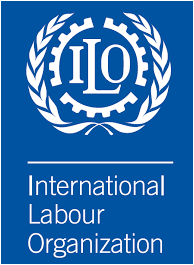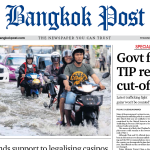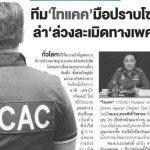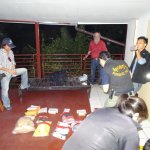
Measures taken by Thailand to fight human trafficking are a step in the right direction and demonstrate an increased commitment by the government, a program officer for the International Labor Organization (ILO) of the United Nations said last week,
as the Prime Minister allocated funds to investigate state officials allegedly involved in the crime.
Meanwhile, a spokesman of the National Policy Committee to address human trafficking and illegal fishing, said last Friday the mooted idea to let prisoners work on fishing vessels has not been and will not be implemented, noting that it came up in response to a broader directive which aims to provide career training and help former convicts reintegrate into society on the basis of voluntary participation and compliance with labor laws.
Max Tunon, Senior Program Officer for the ILO Asia and Pacific Office, said his agency was “particularly pleased” to see the Thai government adopting and implementing regulations to protect workers in the fishing sector. “The real challenge, however, will be to ensure the laws and regulations are enforced,” Tunon said, adding that the ILO is willing to work with all stakeholders to ensure progress on this issue.
The ILO has been carrying out training programs for labor inspectors, and last year it held several such programs in Thailand’s coastal provinces, where trafficking is most common. Improved complaint mechanisms are also needed, and the ILO is working as well with the Ministry of Labor on that, he said.
Tunon’s comments came as the Thai government has been stepping up and improving upon its on-going efforts to address human trafficking and forced labor issues. The current government, which assumed office after the political change in May 2014, has made a priority of tackling the trafficking problem.
Prime Minister Prayut Chan-o-cha called a meeting of government agencies last week to review their work in cracking down on trafficking and told them to expedite their efforts. In his weekly television address he urged “the Department of Fisheries to conclude its regional Memorandum of Understanding regarding lawful work practices, licensing and installing GPS navigation devices on fishing boats, as well as banning children ages below 18 from working in the fishing industry.’’
The Prime Minister also demanded that all agencies join in a strict crackdown on human trafficking, prostitution in women and children as well as forced labor. He allocated an extra US$30 million to the National Anti-Corruption Commission to investigate wrongdoing by corrupt officials aiding or benefitting from smuggling of migrant workers.
Deputy Foreign Minister Don Pramudwinai stated at a press conference that 104 people who had broken trafficking laws had been convicted in 130 court cases, while registration of migrant workers had exceeded 1.6 million. The national verification process for them is on-going and expected to be completed by March 31. PM's Office Minister Suwaphan Tanyuvardhana said officials would take “drastic action” against people smuggling of migrant workers once concrete evidence has been obtained against these people and their financiers.
Meanwhile, the mooted idea to let prisoners work on fishing vessels – which has been recently reported in the media and provoked strong reactions from human rights and labor organizations – has not been and will not be implemented, according to Sek Wannamathee, Foreign Ministry Spokesperson in his capacity as a member of the Sub-committee on public relations and laws under the National Policy Committee to address the problems of human trafficking and illegal, unregulated, and unreported fishing (IUU).
According to the Ministry’s press statement, the initial idea was in response to a broader social policy directive to provide career training for prisoners and help former convicts reintegrate into society with honor and dignity through skill development and jobs in various industries. Implementation of the overall directive will take into account, among others, key considerations that participation is strictly on a voluntary basis, and employment through the scheme fully complies with all related labor laws with mandatory contract requirements to ensure rights and protection of participants.
Human rights and labor organizations have expressed concerns about the idea seeing it as a threat to the human rights of prisoners, saying that use of prison labor would violate international human rights standards and codes of conduct.




